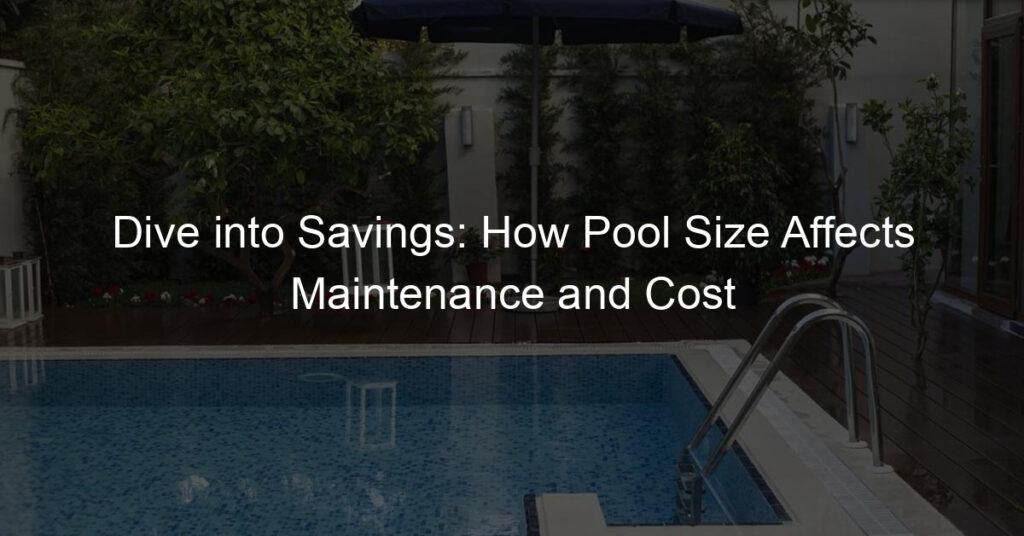Introduction: Understanding Pool Maintenance Cost
Having a swimming pool in your backyard is a luxury that many people dream of. However, owning a pool comes with its own set of responsibilities, including regular maintenance. Understanding the cost of pool maintenance is crucial in ensuring that your pool remains a source of joy and not a financial burden. In this blog post, we will take a comprehensive look at pool maintenance and the factors that affect its cost.
- Overview of Pool Maintenance
- Factors Affecting Pool Maintenance Cost
Pool maintenance involves a series of tasks that ensure your pool is clean, safe, and enjoyable. These tasks include regular cleaning, water testing and balancing, equipment checks, and repairs. Regular cleaning involves removing debris, brushing the pool walls, and vacuuming. Water testing and balancing ensure that the chemical levels in your pool are safe for swimming. Equipment checks involve inspecting the pool pump, filter, and heater to ensure they are working correctly. Repairs may be necessary if any part of the pool or its equipment is damaged.
Several factors can affect the cost of maintaining your pool. These include the size of your pool, the type of pool (in-ground or above-ground), the type of pool equipment you have, the age of your pool, and the frequency of use. Larger pools generally cost more to maintain because they require more chemicals, more cleaning, and more equipment checks. Similarly, in-ground pools typically cost more to maintain than above-ground pools because they are often larger and more complex. Older pools may require more frequent repairs, which can also increase maintenance costs. Finally, pools that are used frequently may require more regular cleaning and chemical balancing, which can also add to the overall cost.
Impact of Pool Size on Maintenance and Cost
When it comes to owning a pool, one of the key factors that influence the cost and maintenance is the size of the pool. In this section, we will explore the impact of pool size, focusing on small pools and their maintenance.
Small Pool Maintenance
Small pools, often referred to as plunge pools, are becoming increasingly popular due to their compact size and ease of maintenance. Let’s delve into the benefits of small pools and the cost of maintaining them.
- Benefits of Small Pools
- Cost of Maintaining Small Pools
Small pools offer a number of advantages. They require less space, making them ideal for smaller yards. They are also easier to maintain due to their size. The smaller the pool, the less water it holds, which means less chemicals are needed to keep it clean. This can result in significant savings over time. Additionally, small pools can be heated more quickly and efficiently, providing a comfortable swimming environment while reducing energy costs.
The cost of maintaining a small pool is generally lower than that of a larger pool. This is primarily due to the reduced amount of chemicals and energy required. According to a study, the average monthly cost of maintaining a small pool is around $50 to $75. This includes the cost of chemicals, electricity, and routine cleaning. However, the actual cost can vary depending on factors such as the type of pool, the climate, and the frequency of use.
In conclusion, small pools are a cost-effective and manageable option for homeowners. They offer the benefits of a swimming pool without the high maintenance costs and efforts associated with larger pools. However, it’s important to remember that the cost and maintenance of a pool can vary based on several factors, so it’s always a good idea to do your research and consider your specific needs and circumstances.
Large Pool Maintenance
When it comes to maintaining a large swimming pool, there are several aspects to consider. Let’s dive into the challenges and costs associated with large pool maintenance.
- Challenges of Large Pools
- Large Pool Maintenance Cost
Large pools, while enjoyable, come with their own set of challenges. The first challenge is that they require more chemicals to keep the water clean and safe. This not only increases the cost but also the time spent on maintenance. Additionally, large pools have more surface area, which means more cleaning is required to keep the pool walls and floor free from algae and other contaminants.
Another challenge is the need for more powerful equipment. Larger pools require stronger pumps and filters to circulate and clean the water effectively. This equipment can be expensive to purchase and operate.
The cost of maintaining a large pool can vary greatly depending on several factors. On average, you can expect to spend between $1,200 and $1,800 per year on chemicals alone. The cost of electricity to run the pump and filter can add another $800 to $1,200 per year. Additionally, you may need to hire a pool service, which can cost anywhere from $80 to $150 per month.
It’s also important to factor in the cost of unexpected repairs. Pumps, filters, and heaters can break down and need to be replaced, which can add significantly to your annual pool maintenance cost.
In conclusion, while large pools can provide a great deal of enjoyment, they also require a significant investment in terms of time and money for maintenance. By understanding these costs upfront, you can make an informed decision about whether a large pool is the right choice for you.
Swimming Pool Upkeep Cost: A Detailed Breakdown
Understanding the cost of maintaining a swimming pool is crucial for every pool owner. This section provides a comprehensive breakdown of the costs involved in the upkeep of both small and large pools.
Cost of Pool Maintenance: Small vs Large Pools
The cost of maintaining a swimming pool can vary greatly depending on its size. Let’s delve into the specifics.
- Comparison of maintenance cost for small and large pools
- Case study: Pool size cost comparison
Small pools, typically those under 10,000 gallons, usually require less maintenance than larger ones. The average monthly cost for maintaining a small pool can range from $50 to $100. This includes the cost of chemicals, cleaning, and minor repairs.
On the other hand, large pools, those over 20,000 gallons, can cost between $100 and $200 per month to maintain. This is because they require more chemicals, more frequent cleaning, and potentially more repairs.
It’s important to note that these are average costs and actual expenses can vary based on factors like pool usage, local climate, and the specific features of your pool.
Let’s consider a case study to better understand the cost difference. Suppose we have two pools: a small one with a capacity of 5,000 gallons and a large one with a capacity of 25,000 gallons.
| Pool Size | Average Monthly Chemical Cost | Average Monthly Cleaning Cost | Total Average Monthly Cost |
|---|---|---|---|
| Small (5,000 gallons) | $20 | $30 | $50 |
| Large (25,000 gallons) | $50 | $75 | $125 |
As the table illustrates, the cost of maintaining a large pool is generally higher than that of a small pool. However, the joy and benefits of having a pool can far outweigh these costs, especially if you take proactive steps to manage them effectively.
Maintenance of Different Pool Sizes: What to Expect
When it comes to pool maintenance, the size of your pool can greatly influence the amount of work and cost involved. In this section, we will delve into the specifics of maintaining different pool sizes and provide key takeaways for pool owners.
- Understanding the upkeep of different pool sizes
Whether you have a small backyard pool or a large Olympic-sized one, each comes with its own set of maintenance requirements. Let’s break it down:
| Pool Size | Upkeep Tasks | Average Time Spent |
|---|---|---|
| Small Pools | Regular cleaning, chemical balance checks, filter changes | 2-3 hours per week |
| Medium Pools | All of the above, plus more frequent filter changes and additional water testing | 3-5 hours per week |
| Large Pools | All of the above, plus additional cleaning and possibly professional maintenance | 5+ hours per week |
As you can see, the larger the pool, the more time and effort is required for its upkeep. However, this doesn’t necessarily mean that smaller pools are always the better choice. The right pool size for you depends on your lifestyle, budget, and how much time you’re willing to dedicate to maintenance.
- Key takeaways for pool owners
Here are some important points to remember:
- Regular Maintenance is Essential: Regardless of your pool’s size, regular maintenance is key to keeping it clean and safe.
- Cost Varies: Larger pools will generally cost more to maintain due to the increased amount of water, chemicals, and cleaning time.
- Consider Your Lifestyle: If you’re a busy person, a smaller pool might be a better fit. If you love hosting pool parties, a larger pool might be worth the extra maintenance.
In conclusion, understanding the maintenance requirements of different pool sizes can help you make an informed decision about the best pool size for your needs. Remember, a well-maintained pool is a happy pool!
Practical Tips for Reducing Pool Maintenance Cost
One of the key factors that can help you significantly reduce your pool maintenance cost is making the right choice about your pool size. Let’s delve into this topic a bit more.
Pool Size and Upkeep: Making the Right Choice
When it comes to pool size, bigger isn’t always better. The size of your pool can greatly impact the amount of time, effort, and money you spend on its upkeep. Here are a couple of things to consider:
- Choosing the right pool size for your needs
- How pool size affects upkeep cost
Before you decide on the size of your pool, it’s important to consider your needs and lifestyle. If you have a large family or plan to host pool parties often, a larger pool might be a good fit. However, if you’re a small family or a couple who just wants a pool for occasional relaxation, a smaller pool could be a more practical choice. Remember, the larger the pool, the more water, chemicals, and energy it will require, which can add up to your maintenance cost.
The size of your pool directly affects the cost of its upkeep. Larger pools require more chemicals, more water to fill, and more energy to heat. They also take longer to clean, which could mean higher costs if you’re hiring a pool service. According to a study, the maintenance cost for a small pool can be as low as $500 a year, while a larger pool can cost up to $2,000 or more. Therefore, choosing a pool size that fits your needs and budget can help you save on maintenance costs in the long run.
In conclusion, when it comes to pool size, it’s essential to strike a balance between your needs and the ongoing maintenance cost. By making the right choice, you can enjoy the benefits of a swimming pool without breaking the bank.
Effective Strategies for Pool Maintenance
Keeping your pool clean and functioning well is not just about aesthetics or fun. It’s also about safety and cost-saving. Let’s explore some of the best practices for maintaining your pool and how regular maintenance can save costs in the long run.
- Best practices for maintaining your pool
- Regular Cleaning: Skim the surface of your pool daily to remove leaves and other debris. This prevents them from sinking and becoming harder to remove.
- Check Chemical Levels: Test your pool’s water weekly to ensure the chemical levels are balanced. Unbalanced water can irritate skin and eyes and cause your pool to look murky.
- Shock Your Pool: “Shocking” your pool is a process where you super-chlorinate your pool to kill bacteria. This should be done every 1-2 weeks.
- Regular Inspection: Regularly inspect your pool for any signs of wear and tear. Early detection of problems can save you from costly repairs in the future.
- How regular maintenance can save costs in the long run
- Prevents Expensive Repairs: Regular maintenance helps you catch minor issues before they become major problems. This can save you from expensive repairs down the line.
- Extends Pool Lifespan: A well-maintained pool can last several years longer than a neglected one, saving you the cost of a pool replacement.
- Reduces Energy Costs: Regular maintenance ensures your pool’s systems are running efficiently, which can reduce your energy costs.
Pool maintenance is not as daunting as it sounds. Here are some simple steps to ensure your pool stays in top shape:
Regular pool maintenance might seem like a chore, but it can actually save you money in the long run. Here’s how:
In conclusion, regular pool maintenance is not just about keeping your pool clean and safe. It’s also a smart financial strategy. By investing a little time and effort now, you can save yourself a lot of money in the future.
Conclusion: Maximizing Your Pool Investment
As we wrap up this comprehensive guide on pool maintenance and cost, it’s important to take a moment to revisit the key points we’ve discussed. Our goal has been to provide you with the information you need to make informed decisions about your pool and how to get the most out of your investment.
- Recap of the impact of pool size on maintenance and cost: We’ve learned that the size of your pool has a significant impact on both the maintenance required and the overall cost. Larger pools require more chemicals, more energy for heating, and more time for cleaning. However, the joy and benefits of having a larger pool may outweigh these additional costs for some homeowners.
- Final thoughts on pool maintenance and cost savings: Regular maintenance is the key to keeping your pool in top shape and avoiding costly repairs. By staying on top of your pool’s needs, you can extend its lifespan and get the most out of your investment. Simple steps like maintaining the right chemical balance, cleaning regularly, and investing in energy-efficient equipment can lead to significant cost savings over time.
Remember, a well-maintained pool is not only a great way to enjoy your outdoor space, but it’s also a valuable asset that can increase the value of your home. By understanding the costs associated with pool ownership and taking proactive steps to manage these expenses, you can maximize your pool investment and enjoy it for many years to come.














